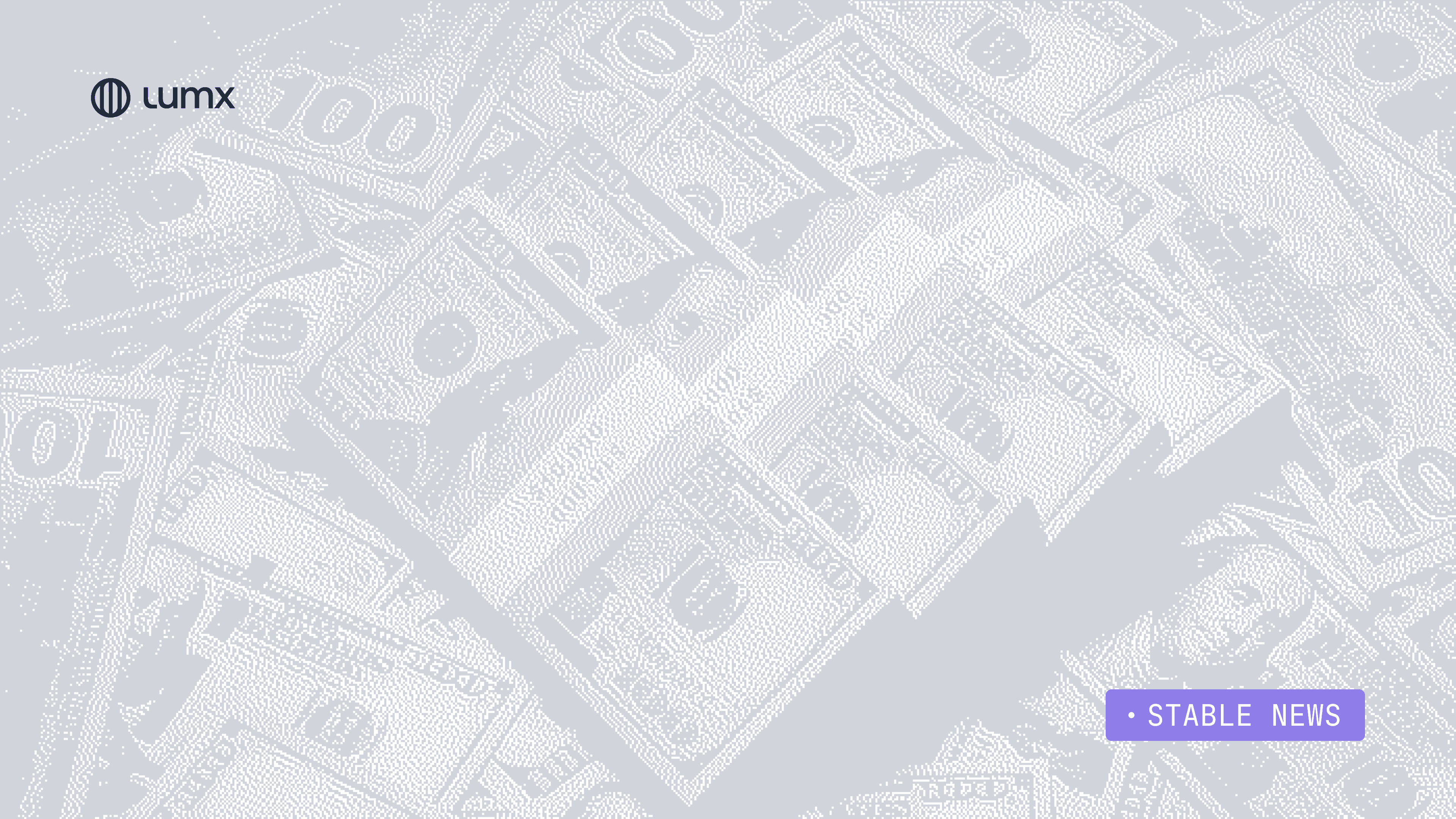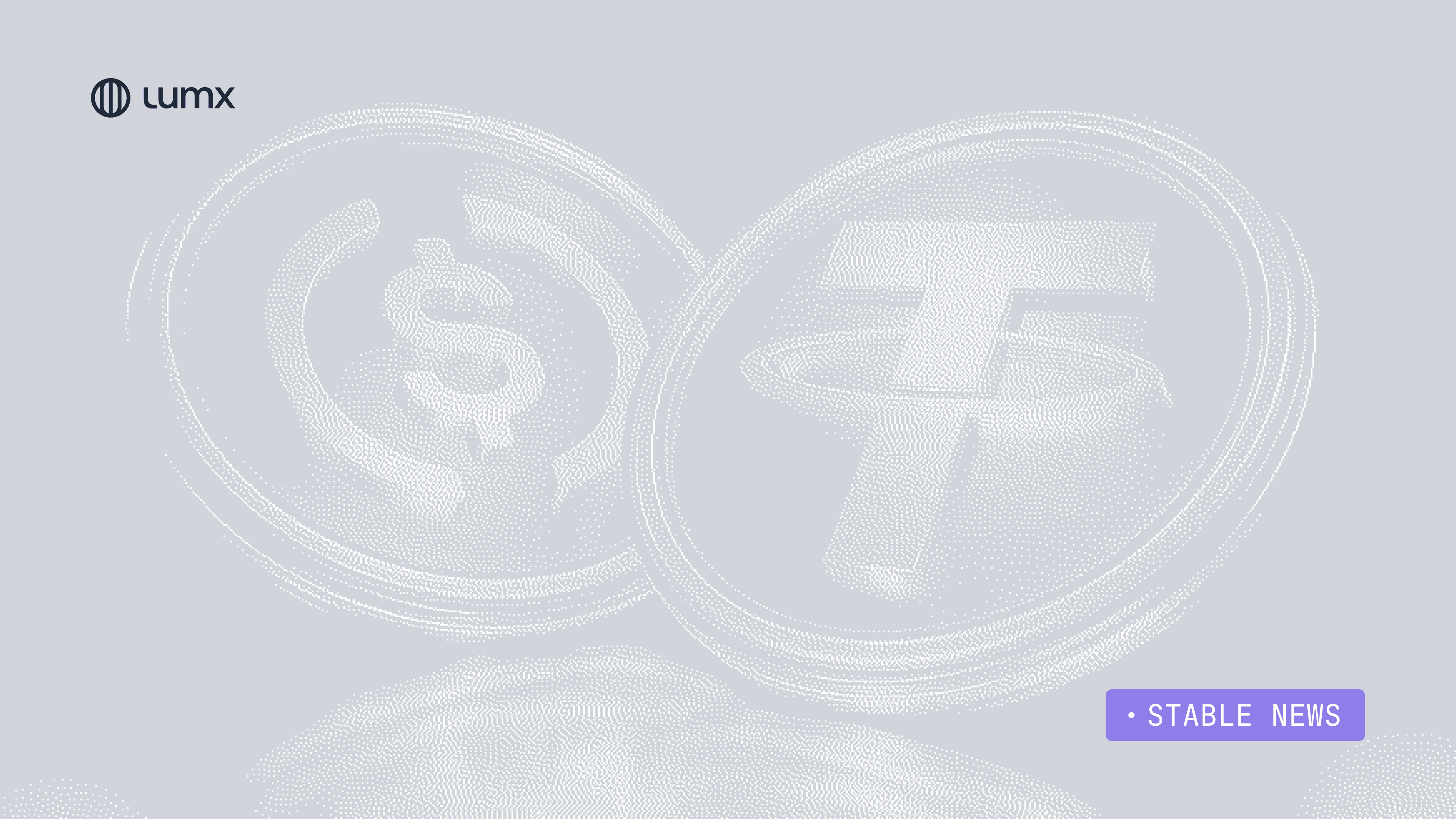Stable News is Lumx’s weekly curation of the key developments in the stablecoin ecosystem and its impact on the digital financial market. In this edition, we highlight Fiserv’s entry with its own FIUSD token, Kraken’s new peer-to-peer payment app, and Mastercard’s technical advances in DeFi integration through Chainlink.
Reading time: 6 minutes
Fiserv launches its own stablecoin with support from Mastercard and Solana
Fiserv, a banking infrastructure giant that processes $2.3 trillion annually, announced the launch of FIUSD, a stablecoin aimed at large-scale banking settlement. The token will be issued with technical support from Paxos and Circle, initially launched on the Solana blockchain, and integrated with Finxact, a core banking system used by over 10,000 financial institutions.
The project includes Mastercard as a partner, ensuring FIUSD acceptance at more than 150 million merchants, with planned interoperability with PayPal’s PYUSD. Fiserv promises a plug-and-play model for banks and merchants, with no need to replace existing infrastructure.
Why it matters:
✅ Fiserv is converting its existing network into stablecoin-compatible infrastructure, making adoption easier for regional banks and retailers.
✅ With Solana-based settlement and token interoperability, FIUSD could set a new standard for institutional digital payments.
✅ Fiserv’s entry confirms that stablecoins are directly impacting the traditional revenue model of the payments industry.
Kraken launches Krak app and joins the race for P2P payments with stablecoins
Kraken, one of the largest crypto exchanges in the world, launched Krak, a peer-to-peer payments app enabling crypto and fiat transfers across 100+ countries. The app offers up to 10% yield on over 20 digital assets and will soon support both physical and virtual cards.
Krak positions itself as a direct competitor to Venmo, Cash App, and Wise, and comes after Kraken’s recent move to support tokenized stock trading, expanding its scope beyond crypto.
Why it matters:
✅ Crypto exchanges are evolving into financial superapps, integrating payments, investments, and yields into one interface.
✅ Kraken’s move shows that crypto-native players are seeking consumer-facing dominance, challenging traditional fintechs.
✅ Krak’s architecture eliminates banking intermediaries, prioritizing liquidity and stablecoin transfers—a clear bet on alternative rails.
Tokenized stocks arrive on Solana, Kraken, and Bybit with 24/7 trading
Backed Finance officially launched xStocks, tokenized shares of over 60 companies, including Apple, Tesla, Meta, and Coinbase. These assets are now tradable on Kraken, Bybit, and DeFi apps on the Solana network, such as Kamino, Raydium, and Jupiter.
In addition to trading, xStocks can be used as collateral in protocols like Kamino Lend. Trades occur 24/7 with near-instant on-chain settlement, and tokens are backed 1:1 with real shares.
Why it matters:
✅ Tokenized stocks are becoming a bridge between traditional markets and DeFi, opening access to global assets via crypto wallets and public networks.
✅ Using stablecoins as a settlement method makes the system faster and less reliant on intermediaries.
✅ These initiatives point to a future where stocks, stablecoins, and DeFi apps coexist in a continuous, accessible, and programmable financial ecosystem.
Mastercard enables crypto purchases on DEXs via card and Chainlink integration
In partnership with Chainlink, Mastercard now allows direct crypto purchases on DEXs like Uniswap through Swapper Finance. The solution leverages infrastructure from Zerohash and Shift4, with integrated processing and compliance to execute fully on-chain transactions.
This marks the first time a traditional card enables fiat balance to interact directly with smart contracts on DeFi, without a centralized exchange as intermediary.
Why it matters:
✅ A significant technical step toward integrating traditional payment infrastructure with decentralized crypto protocols.
✅ Lowers the barrier for traditional users to enter DeFi with a familiar experience, potentially accelerating adoption.
✅ Suggests a new direction for smart contract-based digital payments, where cards become interfaces to the on-chain world.
Robinhood plans to tokenize stocks for European users
Robinhood revealed plans to develop its own blockchain focused on tokenized stock trading for European investors. The initiative was shared during an interview with CEO Vlad Tenev as part of the platform’s international expansion and infrastructure roadmap.
The goal is to enable fractional U.S. stock trading, available 24/5 and settled via smart contracts in an on-chain environment—similar to Coinbase’s xStocks model, but with proprietary architecture and full value chain control.
Why it matters:
✅ Shows that stock tokenization isn’t limited to institutional issuers, digital platforms are building their own infrastructure to compete.
✅ Signals a trend toward full-stack finance, where brokerages evolve from front-ends to also owning the technical and legal rails of transactions.
✅ The tokenized stock race is about both user experience and regulatory control, especially within the European context.
Lumx on Brazil Crypto Report: building stablecoin infrastructure in LATAM
This week, Caio Barbosa, co-founder and CEO of Lumx, joined Aaron Stanley on the Brazil Crypto Report podcast. He shared insights from Lumx’s journey to becoming a B2B payments infrastructure provider via stablecoins.
Topics included corporate treasury, opportunities in Asia, custody challenges, and the real pain points Lumx helps solve for companies seeking more efficient alternatives to traditional banking systems. Worth the listen, the link is below.
🎧 Listen to the full episode here
Stablecoins, tokenization, and the emerging architecture of the digital financial system
What unites Fiserv, Kraken, Backed Finance, and Mastercard in this edition is not just their adoption of stablecoins, but how each is attempting to rebuild the technical foundations of digital money. From P2P apps to tokenized collateral, from card settlement to core banking compatible with FIUSD, we're seeing convergence among players that once operated in separate spheres.
The line between stablecoins, tokenized stocks, DeFi, and payments is blurring, demanding clear standards, real interoperability, and technical trust. With every new announcement, the race is on to build the machinery of this new economy, delivering scale, security, and usability.
See you in the next edition. Until then.





